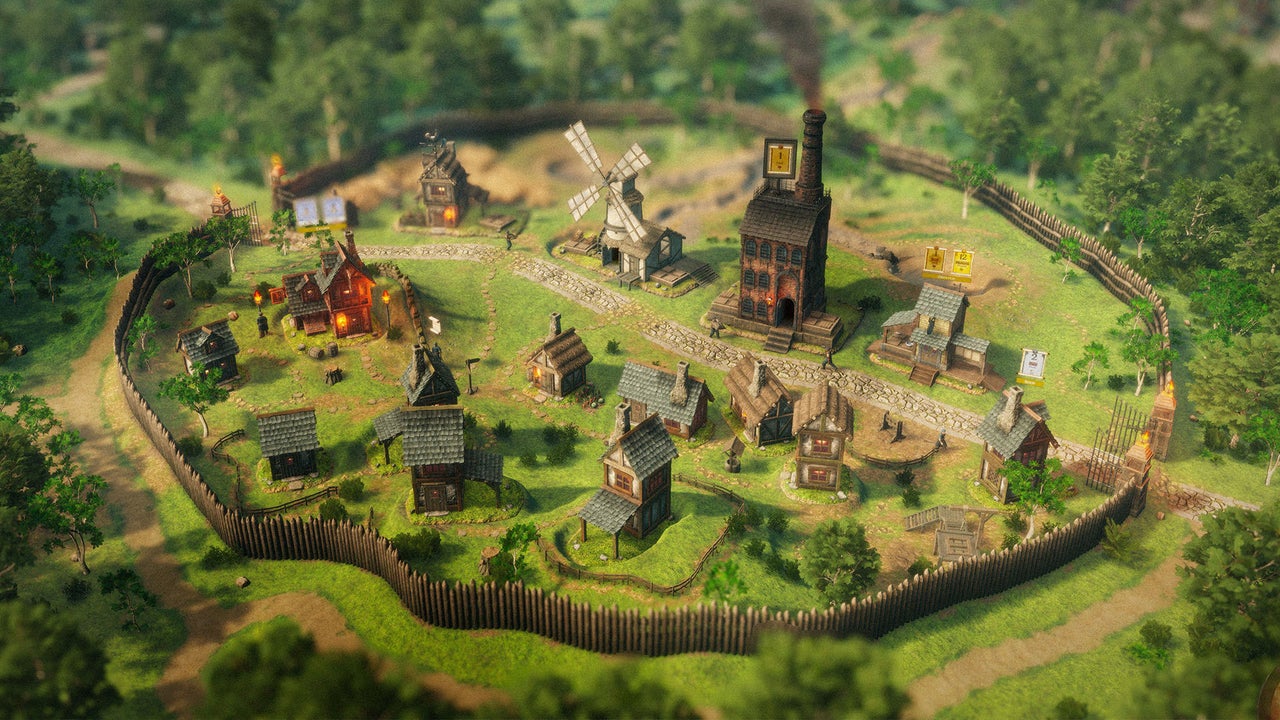Albion's New Master: Peter Molyneux Returns to His Roots

The reveal trailer for *Masters of Albion*, Peter Molyneux's return to "traditional" gaming after a long stint in mobile development, transports us to "the familiar, vast world of Albion." This realm, of course, is the beloved setting of the *Fable
RPG series, where Molyneux served as creative lead at Lionhead Studios throughout the 2000s. However, this time, he's not crafting a new *Fable* (that's Microsoft and Playground Games' domain), but rather a unique blend of old and new.
*Masters of Albion
aspires to be a Molyneux Greatest Hits, a project that reimagines ideas from his past games for the modern age. The outcome appears to be a cocktail of *Dungeon Keeper*, *Black & White*, and *Fable* â a city-building god game that also functions as a third-person RPG. Molyneux's signature grand ambition is undeniably back.
It's best to dissect *Masters of Albion
piece by piece. Starting with the god game elements, rooted in the design DNA Molyneux established with *Populous* in 1989. Played from an isometric perspective, you guide a growing population, nurturing them from a humble village into a collection of thriving towns. Laying down resources and constructing buildings form the foundation, but there are a variety of fun, distinctly Lionhead-esque ideas, such as crafting your villagers' meals in a digital kitchen (with options ranging from soup and sandwiches to, yes, rats).
Crafting towns that are both economically sound and physically resilient is crucial. "We've got this very simple mechanic where by day everything's peaceful, you can explore, you can plan, you can build, you can create," Molyneux explains in an interview preceding the game's unveiling. "And then by night, everything will attack everything you own."
Trolls, zombies, werewolves, and other horrors descend as darkness falls. This is where another familiar concept comes into play. As in *Black & White*, your in-game avatar is a gigantic, floating hand capable of performing miracles. Smiting foes with divine bolts of lightning and flamethrowers is equally important to using those divine digits to assemble houses and factories in build mode.
"I think the hand can be a lot more than just picking things up," Molyneux states, referencing the simpler version featured in *Black & White
and his aim to evolve it for *Masters of Albion*. "I think we can enhance it. We can make people feel really powerful [and] creative with that hand."
#
Eye in the Sky, Boots on the Ground
The brief trailer revealed at gamescom 2024's Opening Night Live doesn't delve into how this next-generation hand has evolved beyond its 20-year-old predecessor. However, it does showcase a surprising nod to 1997's *Dungeon Keeper*, promising to transform *Masters of Albion
into a wild genre hybrid.
"I loved the Hand [in Dungeon Keeper]," enthuses Molyneux. "I loved being able to pick things up. I loved being able to possess things, but it didn't feel like they comfortably lived together. [...] So what I decided to take is possession mode, but take it in a way that improves and enhances it, makes it meaningful and deep."
> You can point at any living creature in your kingdom and take direct control of it.
In *Masters of Albion*, you can point at any living creature in your realm and assume direct control of it. This could be a villager, a soldier, or even one of Albion's beloved chickens. More likely, though, it'll be your hero; a customizable character with their own RPG skill tree, weapons, and armour. They are, essentially, a *Fable*-like protagonist. And when you possess them (or, yes, a chicken), the camera shifts from the top-down god view and settles behind them, adopting a familiar third-person perspective.
"Possession enables you to play the game rather like the *Fable
combat system," Molyneux elaborates. "You can use magic and you can fight, you can blend the two styles together."
But possession mode isn't solely about commanding a warrior to repel your enemies. "You can explore," Molyneux explains. "And in exploring this vast land of Albion, inspired by *Fable*, which was inspired by old England, there are many, many places to explore and find."
The world of Albion is shrouded in a fog of war, where your god hand holds no power. It's through possessing your hero that you'll unveil the secrets hidden within that mist, pushing the clouds back to unlock more land for your divine hand to interact with. The two modes become interdependent; you can't construct cities in god mode without exploring via possession mode, and your hero needs new weapons that must be forged in god mode (or, indeed, baked â that recurring *Fable
sense of humour means you can send your hero to war wielding a baguette blade).
Importantly, Molyneux doesn't want possession mode to feel like an optional extra. "You can play the majority of the game in that third-person view, which is fantastically exciting," he states.
"I think my realisation after all these years is I don't want to create a game which forces you, the gamer, to be a certain sort of player," he explains. "I want you to think, âWell, I'm not interested in god mode, I'm interested in possession mode, I'm interested in fighting, I'm interested in creating the armour and the weapons that my hero is going to use in possession mode.â That's fine."
#
Playing God in Old Albion
The demonstration of possession mode in *Masters of Albion*'s trailer is both impressive and somewhat clunky (perhaps expected, given that it's being developed by a lean 20-person team rather than a AAA studio). Considering this, I approach expectations with caution. It's difficult to imagine this RPG side being entirely fulfilling if played as the primary mode. However, Molyneux and his team at 22cans have ambitions of working with the same RPG fabric that *Fable
was cut from. This implies a significant connection to the concepts of good and evil, with physical transformations based on your choices.
"Your hand will morph, your hero will morph," Molyneux promises, echoing both *Fable
and *Black & White*. "The whole landscape will morph to reflect what you are doing."
He hopes, however, that things will be far more nuanced than *Black & White*'s binary ethics. "We have these factions in the game, the Lords' faction and the Commoners' faction, and which you are going to support allows us to measure whether you are a person of the people or a person of the aristocracy. So there's a lot more interesting things going on."
There are also systems that breed consequences not directly linked to any moral code. "You can design whatever building you want and these buildings have functions, so you can make a building that's a farm and a mill and a factory and a pub and an inn and a housing block," explains Molyneux. "And it can be one monstrous building. But be careful. The more you put things together, the more you stress those buildings, the more pollution they cause, and the whole landscape will morph to reflect the pollution you've got."
Perhaps this is what Molyneux means by striving for nuance â pollution isn't as clear-cut as, say, forcing children to work in factories and eat rats, but it's still a philosophical issue that divides opinions.
> It's an interesting universe that *Fable
touched upon and really I think *Masters of Albion* extends and expands that.
*Masters of Albion
sounds like classic Peter Molyneux; a grand, ambitious concept that draws inspiration from across the industry (or, at the very least, across the UK's Guildford region where he has always worked). And with classic Molyneux comes ideas that inevitably raise questions about their feasibility. This time, it's a question of legality rather than scope: Albion is the setting of *Fable*, which is owned by Microsoft. So how are Molyneux and 22cans able to set this new game, unaffiliated with Microsoft, in Albion? Is it perhaps a different world, simply sharing the same name?
" *Fable
was set in Albion, *Masters of Albion* is set in Albion," Molyneux clarifies.
So this *is
the same world. And the reason 22cans can use Albion, at least according to Molyneux, is because Albion is the historical term for Great Britain. "[It's] like saying if you set a game in America, you can't set any other game in America," he says. "So Albion can't be copyrighted. It's the name for England and Wales and that's how we get away with it."
By this logic, the argument seems to be that *Fable
doesn't take place in a fantasy world, but simply in historical England â a place that, despite the inclusion of comedic chickens, presumably cannot be copyrighted?
"I don't know if I'm honest, I don't really know," Molyneux admits. "I hope so. I mean you would think that the responsible person I should be, I would've spent the last six months in lawyers' offices..."
If there are legal hurdles for 22cans to navigate, they will emerge in due course. For now, Molyneux's focus is on exploring the untapped potential of the setting. "It's an interesting universe that *Fable
touched upon," he says, "and really I think *Masters of Albion* extends and expands that.
"But it's not actually *Fable 5
or anything like that," he emphasizes. "But if you've played *Fable*, then definitely *Masters of Albion* will be familiar to you. One of the things that we have got and we absolutely wanted a nail was the humour. I think in the *Fable* games, it's not so much about telling jokes, it's more about giving you, the player, the ability to do ridiculous and funny things. And we've got that in *Masters of Albion* in absolute spades. I think weâre really nailing that."
*Masters of Albion
may not be a new *Fable* game, but it is a fresh take on *Fable*'s world â a spin that reunites Peter Molyneux with the god game ideas that formed the bedrock of his career. We'll need to see much more of this curious genre hybrid before we can determine if its ambitions are achievable, but it's undeniably exciting to see one of gaming's most prolific creators return with something so distinctively born from his inventive mind.





